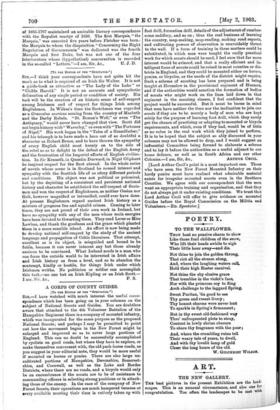PTO THE EDITOR OP THE "SPECTATOR:1
SIR,—I think your correspondents have not quite bit the mark as to what is required of an Irish Sir Walter. It is not a guide-book as attractive as " The Lady of the Lake " or " Childe Harold." It is not an accurate and sympathetic delineation of any single period or condition of society. His task will be the creation of an historic sense of self-respect among Irishmen and of respect for things Irish among Englishmen. In Wilkes's time the Scotchman was regarded as a Graeculus esuriens coming from the country of Macbeth and the Derby Rebels. " St. Ronan's Well," or even " The Antiquary," would never have changed that view. Scott did not begin history with" Waverly," or even with "The Fortunes of Nigel." His work began in the "Tales of a Grandfather," and his triumph is to have made a hero out of so doubtful a character as Robert Bruce, and to have thrown the sympathy of every English child most keenly on to the side of the rebel so as to delight in the defeat of the English Army and the frustration of the Imperial efforts of English civilisa- tion. In Sir Kenneth, in Quentin Durward, in Nigel Oliphant he inspired respect for the Scot abroad. In the whole series of novels whose scene is in Scotland he roused interest and sympathy with the Scottish life of as ns'any different periods and conditions. His object was not political or polemical, but by the depicting of a consistent and persistent national history and character he established the self-respect of Scots- men and won the respect of Englishmen, as neither Ossian nor Galt, however magnified or intensified, could ever have done. At present Englishmen regard ancient Irish history as a mixture of gorgeous lies and squalid crimes. Coming to later times, they are not proud of their own work in Ireland, but have no sympathy with any of the men whose main energies have been devoted to thwarting them. They read Lever or Miss Lawless, and thank the goodness and the grace which planted them in a more sensible island. An effort is now being made to develop national self-respect by the study of the ancient language and propagation of Celtic literature. That attempt, excellent as is its object, is misguided and bound to be futile, because it can never interest any but those already anxious to be convinced. What Ireland needs is a man who can force the outside world to be interested in Irish affairs and Irish history as from a level, and so to abandon the contempt, kindly or hostile, for things Irish under which Irishmen writhe. No politician or soldier can accomplish this task,—no one but an Irish Kipling or an Irish Scott.—










































 Previous page
Previous page